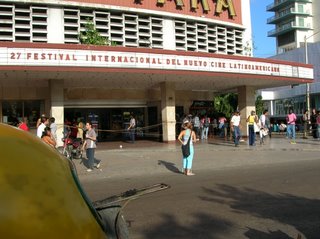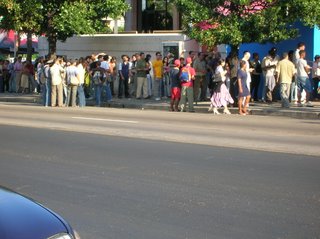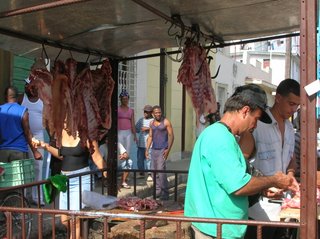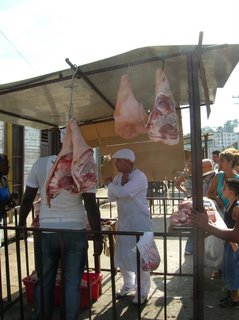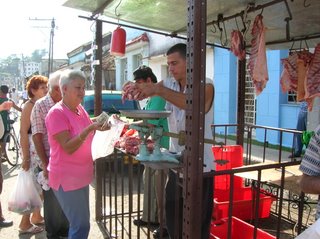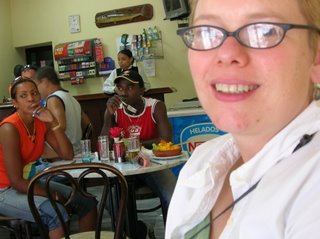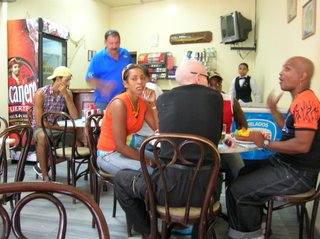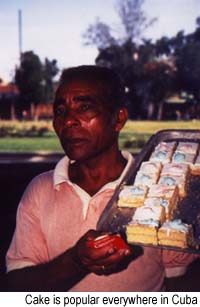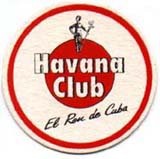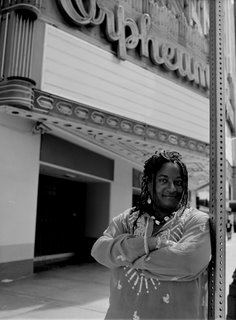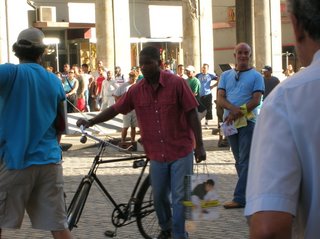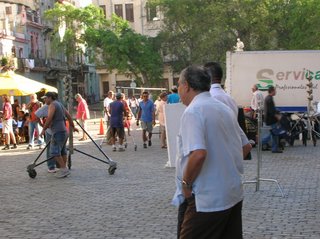Moving to Vedado gave us a different perspective on Havana. Before the Revolution this was THE neighborhood, the place where rich Cubans, especially foreigners and the Italian Mafia lived the good life.



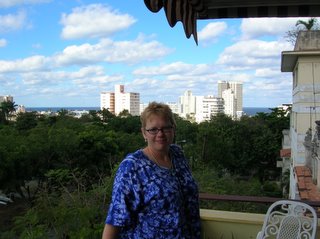
You can see it in the amazing mansions, though many are now a bit busted, they're still very spectacular. The high rise apartment buildings have terraces, some a bit off kilter, that afford people living there magnificent views of the ocean. Vedado even has bountiful trees and green grass space where people play soccer, or chill out in the shade, a great place to nap in the park, as Nicole can testify. This neighborhood is also more developed than Habana Vieja and Centro Habana, and is where you can find most of the movie theatres. What was also intriguing about our domestic relocations was meeting our various hosts. To recount a bit, before moving to Vedado, Nicole and I actually stayed in two casa particulars in Habana Vieja.

The first few nights we were in Rafaela & Pepe's home ( the gentleman with the scars mentioned earlier). The rooms were ornate with Greco-Roman (but really African) columns, and the ceilings were huge. The first night we got there after 2am we settled into sleep lulled by the sounds of people playing dominos and chatting, and we were awakened by those same sounds mixed with the sounds of a primary school across the street.
We have learned that people's apartments are often hot so they socialize a lot outside, extending the community beyond their respective homes. That reminds me of growing up in the Bronx, hearing basketball games going into the middle of the night. Because we had not booked the room for a longer reservation we wound up moving a few blocks away to Pepe's son's casa particular. Eugenio is a doctor who is presently practicing medicine in Venezuela, and like his parents he was very nice to us and very protective. His place we learned was also co-managed by other siblings in the family. It's obvious that casa particulars are a great business to get into, especially ones listed in guide books, because while we were at Eugenio's the phone and door bell rang constantly, foreign travelers like us looking for places to stay. He had to turn some away.
During my first trip to Cuba I stayed in a casa particular managed by two women who cared for me dearly because they worried that my lack of Spanish would get me lost, that's how conscientious some hosts can be. While on that trip I had an interesting conversation with an AfroCuban hip hopper who bluntly asked me why I didn't stay with an AfroCuban family. I explained to him that I had wanted to but that I couldn't find a black Cuban family in any of my research. From that conversation that's when I learned how difficult it is for Cubans of African descent to get into the casa particular business, because it often requires a lot of money to repair housing to the standards for foreign travelers, and because Black Cubans' standards of living still have problems. So, on this second trip I was hoping Nicole and I would be able to find an AfroCuban family to stay with for cultural, political, and economic reasons. That didn't happen on this trip as well, and clearly reflects some of the economic inequity that black people in Cuba are still struggling with. More reflections on that later, but either way, staying in casa particulars gave us slightly better perspectives than staying in hotels catering to tourists.
When me moved to Vedado we stayed with Magali and Raul, our third set of hosts. Their place was amazingly surreal, but it was like stepping back into the 1960s. The furniture, the dishes, even the art work and the lamps reflected that period. Nicole and I both agreed that it felt like staying with our respective grandparents, even though Magali and Raul are probably the same age as our parents. As an aside, Magali told us that the artwork behind us in this photo was her wedding present!



We also learned that Magali was a career military woman with an auspicious history of being one of the first women Cuban soldiers to move up in the high ranks. I'm not really down with militarism but I can appreciate how difficult her struggles were in a macho culture. She told Nicole a great story of how she stood beside Fidel Castro, who commended her high scores but who towered over her like a huge building.
So our first night here was in a small room, and since small can mean different things to different people, here's how small it was.


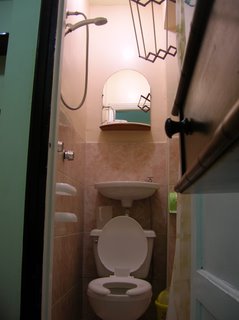
Me being the tv junkie that I am, I was finally glad to get a tv, whatever it's size!


Havana has many faces, like any big city, but it reminds me of home, of living in the Bronx.

Both places are in constant motion...
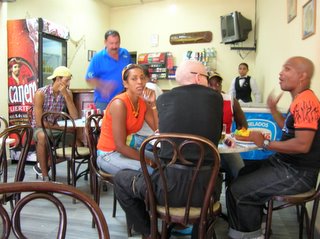
...and both people live to talk.

When I was a kid when doing errands with my Mother the thing that fascinated me about her was how we'd walk the neighborhood and never get far because she'd stop and talk to people, or people would stop her to talk. That's what is was like during our 2 weeks in Cuba...

...meeting people...

...talking & sharing...

... connecting.

We met so many people while going to and from movies and continuing our search for the people who helped me make Bloodletting.

One of the unexpected connections we made was with Dona Gilda Merces Parns Bussue. While Nicole and I were rushing from one place to another Gilda asked me for directions in Spanish. She was like a lot of Cubans who assumed I was Cuban, and would approach me, expecting me to understand. When I'd tell them I didn't speak Spanish initially they didn't believe me. They'd say I looked like someone in their family, or a friend, or a neighbor. That's what happened with Gilda, except that she spoke English with us when she realized.
Gilda is a gentle, graceful, soft spoken woman who speaks English with a Caribbean accent. She told us that she was on her way to meet relatives she had never met before, and that she hadn't spoken English in awhile. My curiosity was piqued. I smelled a story. As Nicole and I walked with Gilda she explained that her father was an AfroCarribean immigrant from one of the islands. He came to Cuba, I believe she said in the early 1900s, because he found work here. He stayed and had a family but he never spoke Spanish and was shy. The relatives she was meeting today were from his home island.

When we told Gilda a little bit about ourselves, and about the documentary, how part of it includes stories about my mother and my brother, she shared with us her reflections on the Unites States. She said that in 1959, after the Revolution, she spent a few months in the U.S. but decided to return to Cuba because she said, "they treat black people terrible there." We exchanged contact information then she invited us to her home, which she said was modest but open to us. She said something like, "I don't have much. It's modest, but what I have is yours." I was touched. We kissed and hugged and went our separate ways, Gilda off to meet long lost relatives, and feeling more confident with her English; me and Nicole off to the festival, both feeling grateful to have made this connection.

Under another shady tree in a small park we met Consuelo Beyuer Roque, and her family, three generations of women, her daughter and her nieta, her granddaughter. Consuelo told us how she struggled and had nothing, that her shoes were even bad. Clearly they were a poor family. Coming from one myself, I was touched by their adversities. It also made me realize that as poor as I am in the United States I am more fortunate than Consuelo and her family.

On my first trip all of the delegates I traveled with brought supplies to give to people, the kinds of things we take for granted, bandages, tooth paste, sanitary napkins, aspirin. This second trip Nicole and I agreed to do the same, and we got a bunch of things to bring. A day before leaving for the trip my Mother wanted to do the same. So she and I went to the .99 Cent Store on Sunset Boulevard, and with a small budget, we got things for people. Before cashing everything out I saw a pair of magnifying reading glasses, and a thought popped into my head that I should get them. I did.
During our conversation with Consuelo, she told us that she couldn't read things because she said she didn't have glasses. Immediately Nicole and I worked out an agreed time to reconnect with Consuelo, to give her a care package along with the reading glasses. When we went our own ways I cried. Though I'm not unfamiliar with poverty it was sad to see a family so poor. I lived in the projects and couldn't afford lots of things, but poverty, whatever its form, is still sad. I never want to get used to it, or to get numb to the pain of poverty.
Wiping my eyes, trying not to get lost in the sadness, we bumped into a tall lean AfroCuban man with locks, pushing a cart. He and I nodded, an obvious mutually respectful connection because of our shared African ancestry, and because of our African locks, what many call dredlocks. Then he introduced himself as "The Fruitman" and asked me if I was a Rastafarian.
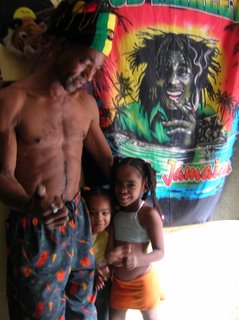

I've been asked that question many times, whether I'm a Rastafarian. By definition it means: "Rasta, or the Rastafari movement of Jah people, is a religious movement that reveres Haile Selassie I, the former emperor of Ethiopia, as King of Kings, Lord of Lords and the Lion of Judah. The name Rastafari comes from Ras Tafari, the pre-coronation name of Haile Selassie I, who Rastas of many mansions say is the earthly aspect of Jah (short for Jehova or the Rastafari name for God) and part of the Holy Trinity." When I asked The Fruitman if there were Cuban Rastafarians he told me that there was a prominent community. It was exciting to know.

From my experiences most Rastas are deeply intellectual and spiritual; they're kind and conscientious; they're usually always vegetarian and environmentally conscious, and they exude a love of life, a love of liberation and justice, and a strong sense of global community. The Fruitman was like this. He showed us photos of his family with international friends. He offered us Cuban ron, and invited me and Nicole into his house, where he introduced us to his wife and adorable daughters. Then he did the ultimate rasta thing: he pulled out a boom banging sound system, and sang us Cuban reggae karaoke, blasting the music so loud that a spontaneous party broke out in the streets in front of his house. He was a star and knew it. We all danced to reggae, he invited us to a rastafarian wedding, we exchanged contact information, and Nicole and I were off again into the streets of Havana. The Fruitman gave me this drawing from right off his wall and wished us well, restoring my sense of life. Big up to the Cuban Rastas and to Rastafarianism everywhere!
 In our desire to learn more about Havana, we discovered that this city is picturesque from all over the island, from Morro Castle to Old Havana, to even the newer neighborhoods uptown. But since we came for the film festival we found ourselves crisscrossing the city, going from one movie theatre to the next, where lines of movier goers snaked down the block and around the corner.
In our desire to learn more about Havana, we discovered that this city is picturesque from all over the island, from Morro Castle to Old Havana, to even the newer neighborhoods uptown. But since we came for the film festival we found ourselves crisscrossing the city, going from one movie theatre to the next, where lines of movier goers snaked down the block and around the corner. 